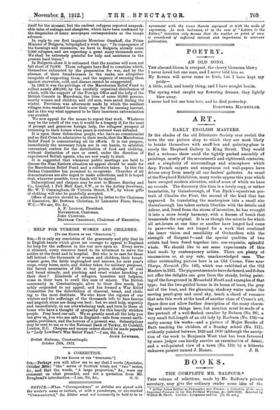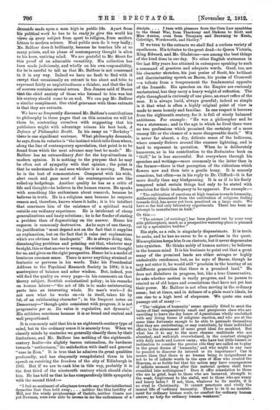BOOKS.
, THE COMPLETE MR. BALFOITR.*
THIS volume of selections, made by Mr. Balfour's private secretary, may give the ordinary reader some idea of the • Arthur James Balfour as Philosopher and Thinker: a Collection of the more' Important Passages in his Non-Political Writings, &c. (1879-1912). Selected by Wilfrid X Short. London : Loagniana and Co. [7s. 6d. net.1
&mends made upon a man -high• in public life. Apart from
his political work he his to be ready5to _give the world hid -
saews every subject from sport to religion, from mOdern
fetters to modern science. Most public men do it very badly; Mr. Balfour does it brilliantly, because he touches life at so
many points, and no phase of contemporary thought is alien to his keen, untiring mina. We are grateful to Mr. Short for this proof of an admirable versatility. His collection has
been made judiciously, and -wholly on his own responsibility, for he is careful to, tell us that Mr. Balfciur is noir concerned in it in any way. Indeed we have no fault -to trod with it ettept" that occaSienally an' extract 'is too short and trite to represent fairly so unplatitudinous.a thinker, and that the list of sources contains, several errors. Ben &mem said of Bacon tidak-the -chief anxiety of those who listened to him was lest his oratory should come to an end. We can pay Mr. Balfour
a similar compliment. Our chief grievance with these eXtraete is that they are extracts.
We have so frequently-discussed Mr. Balfour's contributions to philosophy in these pages that on this occasion we will let them be, contenting ourselves with suggesting that his
publishers might with advantage reissue his best book, A Defence of Philosophic Doubt. In his essay on " Berkeley " there is one significant sentence. What-philosophy demands, he says, f rem its votaries is "the instinct which tells them where, along the line of contemporary speculation, that point is to be Sound from which the next advance may best be made." Mr. Balfour has an extraordinary flair for the key-situations in modern opinion. It is-nothing to the . purpose that he may be often out of sympathy with that opinion ; the point is that.h.e understands it and sees whither it is moving. Hence is the beat of commentators. Compared with his wide, alert reach and gaze most of his contemporaries are like rolled-up hedgehogs. Another quality he has as a critic of fife and thought—he believes in the human reason. He speaks with something like, enthusiasm about research, because be believes in truth. He is a religious man because he respects reason• and, therefore, knows where it halts ; it is his intellect that convinces him of the existence of a spiritual world -outside our ordinary experience. He is intolerant of cheap generalizations and hasty solutions ; he is far fonderof stating a problem than of dogmatizing on the answer. Hence his
erganon is commonly destructive. As he• says of one theory, its justification "must depend not on the fact that it supplies an explanation, but on the fact that it rules put explanations which are obvious but inadequate." -He is- always doing this, disentangling problems and pointing Out that, whatever may, be right, this er that answer is wrong. He orientates our thought for us, and gives-us the right perspective. Hence he is a model of luminous common sense. There is never anything strained or fantastic or perverse in his words. Take his Presidential Address to the Psychical Research Society 'in 1894; it is a masterpiece of balance and sober wisdom. But, indeed, you will find the quality on every page—in • his comments on that thorny subject, Scottish ecclesiastical policy; in his remarks' on-human labour—" the art of life is to make uninteresting parts into an interesting whole. No man's work—I do not care what he works on—is in - itself, taken bit by
bit,-of an exhilarating character "; in his frequent notes on Democracy—" thoughquite consistent with progress, it is not progressive per ee. Its value .is regulative, not dynamic." His criticism convinces because it is, so broad and central and well proportioned.
It is commonly said that his is lin eighteenth-century type of mind, but in the-ordinary sensedt is scarcely :true. When -we olassify minds by centuries we generally classify them•by their limitations, and Mr. Balfour has • nothing of- the eighteenth- century faults—its slightly barren rationalism, its hardness towards " enthusiasm," its satisfaction -with itself and general " ease.in Zion." It is true that he admires its great qualities profoundly, and has eloquently recapitulated them in his speech on receiving the freedom of the city of Edinburgh in 1905. But if we are to rank Mel in 'this way, probably it is the first third of the nineteenth century which should claim him. He has told us that he has etunparalively little sympathy with the second third :— "I feel no sentiment of allegianoo towards any of the intellectual• dynasties that then held -sway; . . . neither the thin lucidity of Mill, nor the windy prophesynigs of Oarlylec neither Comte nor yet Newman, were ever able to -arousain-me the- enthusiasm of• a disciple. . . . I tarn with pleasure from the Corn Law squabbles to the Great War, from Thackeray and Diekens to Scott and 'Miss ,Austen, even from Tennyson and •Browiiing to Keats, Coleridge, Wordsworth, and Shelley." - if We turn to the extracts we shall find a-curious variety of excellences. His tributes to the-great dead—to Queen Victoria, King Edward, and Mr.-Gladstone—are among the best things of the kind done in onr day. No other English'statesman in the last fifty years has attained in extempore speaking to such a command of gracious and adequate words. Good, too, are his character, sketches, 'his just praise of Scott, his brilliant
and discriminating speech on Bacon, his praise 'of Cromwell —a tribute from a temperament the • fundamental opposite of the Ironside. His speeches on the Empire are curiously unrhetorioal, but-they carry a heavy-weight of reflection. The Style throughout is curiously of one piece, an exact reflex of the man. It is always lucid, always graceful; indeed so simple is it that rwhat is often a highly original point of view is made to seem homely: and familiar. In •one respect it borrows- from the eighteenth century, for it is full of nicely balanced antitheses. For example : "He was a philosopher and he was a statesman ; and in the age in which he lived there were
no two professions 'which promised the certainty of a more uneasy life or the chance of a more disagreeable-death." - Wit is never far absent, a dry, delicate sense of the ludicrous, where -comedy flickers around like summer lightning, and is
hard to represent -in quotation. When he is deliberately
humorodsors in his contribution to the Badminton book on "Golf," he is less successful. But everywhere through his
speeches and writings---more commonly in the -latter than in the former—there is that perception of the ridiculous which flowers now and then into a gentle irony. It is scarcely conscious, but often—as in his reply to Dr. Clifford—it is far more deadly than -any bludgeoning. It is as if to his finely tempered •mind certain things had only to be stated with precision for their inadequacy to bee apparent. For example:—
" The cultivation of emotions at high tension towards humanity, deliberately. dissociated from the cultivation of religious feeling towards God,: has-never yet been practised on a large scale. We have so far had only laboratory experiments. There has been no attempt to manufacture in bulk."
Or this:—
"The science [of sociology] has been planned out by some very able philosophers; much as a prospective watering-place is planned out by a speculative builder."
His style, as a rule, is -singularly. dispassionate. It is truth he seeks, and he'has no cause to be a partizan in the quest. His scepticism keeps him from rhetoric, but it never degenerates into cynicism. He'thinks nobly of human nature ; he believes in the human mind. It is his busineis tOpoint out that a great many of the promised lands are either mirages or highly undesirable • residences, but, as he says of Bacon,- though . he may not enter•it, he would still " proclaim in-the hearing of an
indifferent generation that there is a promised land." He does not disbelieve in progress, but, like a true Conservative,
he asks whether motion is really progress, and he pauses to remind us of old hopes and consolations that have not yet lost
their power. Mr. Balfour is not often moving in the ordinary sense; but at times, and in defence of aplain man's ideals, he can- rise to a high level of eloquence. We quote' one such passage out of many:— "The 'religion of humanity' seems specially fitted to meet the tastes of that comparatively small and prosperous class who are unwilling to leave the dry bones of Agnosticism wholly unclothed with- any living tissue of religious emotion, and who are at the same time fortunate enough to be able to pereuade themselves that they are- contributing, or may contribute, by their individual efforts to the attainment of -some great ideal for mankind. But what has it to say to the' more obscure - Multitude who are absorbed,, and well-nigh overwhelmed, in the constant struggle with daily needs and narrow cares ; who have but little leisure or inclination to consider the precise role they are (lolled on to pray in the great drama of humanity,' and who might in any case be puzzled to discover its interest or its importance? Can it assure them that there- is no human being so insignificant as not to be of infinite worth -in' the eyes of -Him who created the Heavens, or so feeble but that his action may have consequences of infinite moment long after this material system shall have crumbled into nothingness ? Does it offer consolation to those who are in grief, hope to, those who are bereaved, strength to the- weak, forgiveness to the sinful, rest to those who are weary and heavy laden ? If not, then, whatever be its merits, it is no rival to Christianity. -It cannot penetrate and vivify the inmost -life of "ordinary humanity. There 'is - in 'it no nourish- ment for ordinary human souls, no, coinfort• for ordinary human serrow, no help for ordinary humairiweaknesa."



























































 Previous page
Previous page